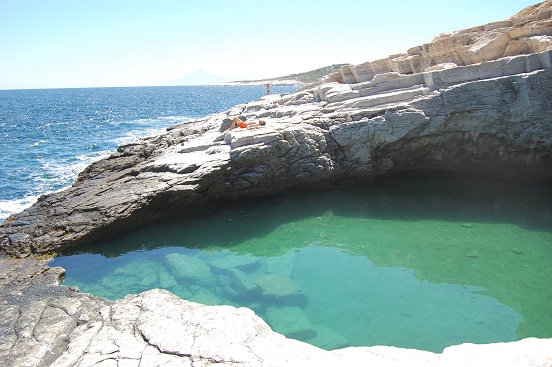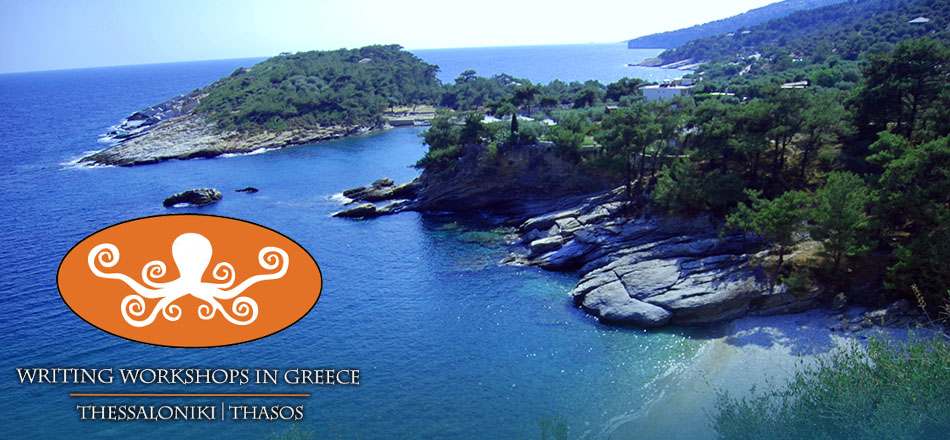Frequently Asked Questions
Q: What does the program fee include? What expenses do I have to cover on my own?
The program fee covers your lodging for the duration of the program, ground transportation, mandatory travel insurance, workshops, off-site group excursions, and several group meals. Depending on your arrival, we can usually arrange airport transfers to and from the airport in Thessaloniki at no charge.
All participants pay for their own airfare to and from Greece.
Breakfast is included. Beyond that, participants are responsible for their own meals and drinks. Past participants have suggested bringing an additional $600-$1,000 for food and drinks for the month.
Q: What is your refund policy?
Of the first deposit, $500 is nonrefundable. After you have paid in full, no refunds are possible.
Q: Do we travel from the U.S. to Greece in one big group? Do I need a visa to enter Greece?
No. Each participant arranges her own travel to and from Greece and is also responsible for securing a passport and any necessary visas (U.S. citizens do not require a visa to enter Greece).
Q: How do we get from the city of Thessaloniki to the island of Thasos?
All participants will ride on a large motor coach from Thessaloniki to the coastal town of Keramoti, where the bus will ride (along with us) on a ferry to the island of Thasos. The ferry ride is short - about thirty minutes one way. The bus will deliver us to the southern town of Alyki, where we’ll stay for the duration of our time on Thasos.
Q: What should I know about our accommodations on Thasos?
A majority of the cohort will stay in rooms at Pension Archodissa, where there is also a restaurant (and a view of the whole peninsula) and some night life.
The rooms there are simple: single beds, a dresser and wardrobe, a mini-fridge, a small table, and a small bathroom with a shower. Note on European bathrooms.
The remainder of the cohort, as well as the faculty, will stay a short walk from Pension Archodissa in small apartments with kitchenettes.
Please note that there are a limited number of single rooms available on Thasos. Shared occupancy rooms are either double or triple accommodation.
View from the balcony of Pension Archodissa
Q: How do I sign up for the class in Greek language and culture taught by Joanna Eleftheriou? Can I take that in addition to my workshop?
Yes, the Greek course is designed as a complement to the writing courses, one which allows writers to make the most of their stay in a place so different from their homes. You sign up at the same time you register. If you aren't sure you'll want to attend every class, you are free to attend in the beginning and then bow out. Some students simply want to get the alphabet down, whereas others are able to devote an hour a day for the duration of the program. Greek students are encouraged to do what is best for them and their writing project.
Q: Is there wireless available at the hotel?
Hotel El Greco in Thessaloniki has fast and reliable wireless. On the island, where things are considerably more rustic, wireless is available on the patio at Pension Archodissa, but patience with the easily overloaded system is sometimes required. Logging off the wi-fi completely when you are not using it will help keep the headaches to a minimum. Additional hot-spots can be found around the island at cafes and restaurants.
Q: How do we distribute drafts for workshop?
Some workshop instructors require that participants arrive with printed manuscripts ready for distribution. After that, new writing is distributed digitally (via email), since we do not have access to printers and photocopiers on the island. Participants should also bring small flash-drives with them, so that work can be shared from computer to computer.
Q: What kind of sightseeing is available on the island of Thasos? How can I explore the island?
Your program fee includes several organized off-site excursions:
1) a day trip to Thasos Town (Limenas) where you can tour the expansive archaeological ruins and excellent museum and enjoy lunch and shopping on the harbor.
2) a Sunday morning visit to the inland village of Theologos with its folklore museum, opportunities for attending a Greek Orthodox liturgy, and sandal shopping. On the return from Theologos, we will stop in the coastal town of Potos for supplies, and then make a visit to the Archangelos Monastery.
In addition to those organized excursions, you will have plenty of free time to explore the island on your own.
A public bus runs around the island a few times each day. Rental cars are available for about $25 a day, though you must be twenty five years of age in order to rent one (and an International Driver's license, easy to get through AAA, makes renting a car easier).The island offers many opportunities for archaeology, hiking, swimming, and spiritual exploration. In addition to many beaches scattered along the coast, there is the remote “Yiola” (a.k.a. the Blue Hole), a stunning natural salt-water pool.

Q: Are there options for sightseeing in addition to the island of Thasos?
Back on the mainland, the port-city of Kavala offers a glimpse of urban life in Thrace, not to mention the extensive Greco-Roman ruins of the city of Phillipi. The Kavala airport connects to Athens with a short flight, not to mention several other European cities. The bus running from Thessaloniki to Istanbul stops in Kavala en route, making it possible to visit Turkey for a long weekend.
Q: I’ve heard there are many opportunities for action and adventuring on Thasos. What kind of equipment do you recommend for that?
There are three beaches within the immediate vicinity of our accommodations and the island boasts hundreds more. Beach shoes, flip flops, sun block, snorkelling and swimming gear are highly recommended. Beach towels are not provided. We also suggest that participants bring a good pair of tennis shoes for some of the lovely (but completely voluntary) long walks we take as a group.
Q: What else should I pack?
A passport, a swimsuit, and your writing gear. That pretty much sums it up.
In truth, you should plan to bring much less that you might be tempted to bring. Our recommendation is a small rolling duffel (there will be some schlepping of your bag, so you want to bring something you are comfortable hauling around). The island, where you’ll spend the majority of your time, is very casual. Many people arrive at workshop on the way to or from a dip in the sea, dressed accordingly. You might pack a few things more suitable for urban adventuring for your time in Thessaloniki. Either way, do not overpack.
A sample packing list is at the bottom of this page.
Q: Will I be able to buy supplies on the island? Are there places to shop for food and go out to eat nearby? Is there an ATM?
The Alyki peninsula is rather remote. By day, some tourists arrive from other corners of the island to invade one of our three beaches. Otherwise it’s pretty quiet.
In addition to the restaurant at Pension Archodissa, there’s a line of restaurants along that beach, including several places with wi-fi. There is also a mini-market there for basic supplies: beer and wine, cheese, basic dry goods, and even fresh pastries and cheese pies in the morning. The cheapest lunch option is the gyros and souvlaki “snack bar” on the second beach, where you can feed yourself for about five dollars. There is no ATM machine in Alyki.
During group excursions, you will have the opportunity to make visit the ATM and stock up on supplies at the supermarket.
Packing List
Necessary Identification & Financial Information:
- Passport (bring an extra photocopy of your passport as well— we recommend emailing yourself a photo of it)
- ATM card with PIN numbers (note: the English letters may not appear on Greek keypads, so be sure you know what the corresponding numbers are! Call your bank before departure to confirm that your ATM card will work overseas & to notify them that you’ll be using yours there so they don’t assume it’s been stolen)
- Student I.D. card (may get you discounts)
- List of all credit card numbers & cancellation information (in case of loss or theft), one to bring with you and one to leave with someone at home.
- Some spending money: don’t carry more than $200 U.S. at any time. Use your ATM card when you need more—you’ll get the best and most current exchange rates that way)
Clothing:
- Jeans: 1 pair
- Other pants (something slightly dressier--khakis, capris, whatever…): 1 pair
- Shorts: 2 pair
- Swimsuit: 1 or 2
- Light jacket (fleece, or waterproof windbreaker)
- Sweater (for at night….cotton): 1
- Short-Sleeve Shirts: 1 or 2
- T-Shirts: 4-5
- Long-Sleeve Shirt: 1
- Underwear & Socks: one week’s supply (to be re-washed)
- A hat (to protect you from sun)
- Dresses: 3-5 sundresses (ideally one that can be dressed up for Thessaloniki chic)
- Skirts: 2-3 (a long skirt will protect your legs from mosquitoes)
- Beach cover ups: 2
Women may want to bring a long dress or skirt, which is required when visiting monasteries and churches.
Shoes:
- Sneakers or Hiking Shoes (good tread, lightweight)
- Sandals (sturdy & comfortable enough for city walking)
- “Tevas” or Flip-Flops (something that can get wet)
Toiletries & Medicines: all the usual
There is a small mini-market with some very basic toiletries, in case you run out.
Course Materials:
- Course books and any required photocopies
- Presentation Materials
- Blank journal book & lots of pens
Other things:
- Camera (put your name on your camera?)
- Beach towel or sheet (something you can fold very small & something that will dry quickly in the sun; if you want to save space, you can purchase an inexpensive beach towel at the mini market)
- Sunglasses
- Sunscreen (you can buy sunscreen in Greece, but it is quite expensive)
- A light backpack (as your carry on; for use at the beach & for day-tripping)
- Flashlight for navigating the goat path at night (LL Bean makes a really nice and light weight solar flashlight that is also waterproof for $25)
Optional items:
- Guide Book for Greece (the best are: The Rough Guide, Lonely Planet, Let’s Go)
- Mask/Snorkel/Fins/Wetsuit
- Rain jacket/poncho
- First-Aid stuff
Things NOT to Bring:
- More than one hair-dryer or curling iron per room (note: if you plan to bring one, you’ll also need a European voltage adapter, but there’s still a good chance it will burn out in about 30 seconds)
- Illegal/Controlled substances
- Valuable jewelry, watches, cameras
- American cell phones (they probably won’t work in Europe, even if your cell phone company tells you otherwise)
- Travelers’ checks: they are sometimes hard to use in Greece and you’ll lose a lot of money using them
- …ANYTHING you’d be devastated to lose or to have stolen!
